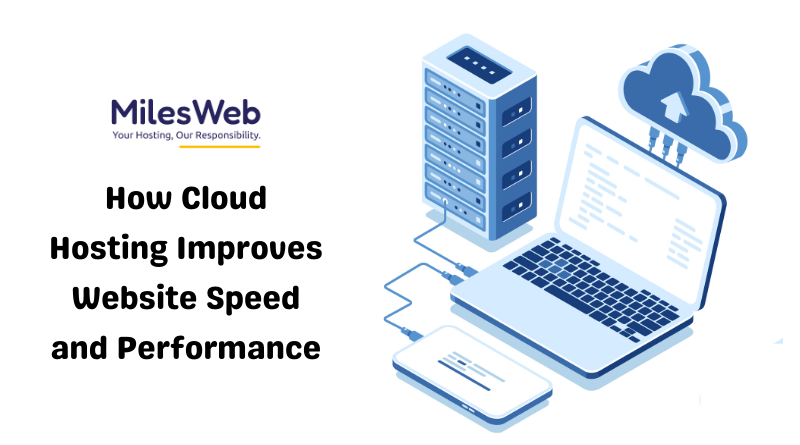How Cloud Hosting Improves Website Speed and Performance
In our modern internet world, the speed and performance of a website are indispensable to user experience, SEO rankings, and general business success. A slow website often means higher bounce rates, lost sales opportunities, and poor customer satisfaction. With affordable cloud hosting pricing providers, users can easily troubleshoot common problems such as dealing with traffic spikes, server downtime, and other resource limitations.
For example, the best Linux cloud server hosting has revolutionized the industry with increased speed, a guarantee of reliability, and an increased ability to accommodate customer changes in demand. Unlike conventional hosting, cloud hosting employs a resource network of servers where resources are allocated at precise and dynamic levels. In an ultimatum, real optimization of server performance and uptime is achieved.
In this blog, we will learn how cloud hosting improves the speed and performance of the website.
Table of Contents
Cloud Hosting: Factors That Improve Website Speed and Performance
1. Distributed Infrastructure for Faster Load Times
Traditional hosting, like shared or dedicated hosting, is when a single physical server retains a shared processor and a database to perform slow web services. Hence, the future demands for computing power boost increases invite server disk overload situations.
In cloud hosting, several servers reside in a cloud network, each storing parts of your data, so they are called disparate architectures. They are also interconnected with redundancy through a guaranteed performance infrastructure. The data center can process requests much faster; the load time of a page overall on average increases with our infrastructure.
Key Advantages:
- Improved processing of data and content delivery speeds
- Lessened chance for server overload
- Maintaining a balance of load prevents restraining performance
2. Automatic Handling of Traffic
Domains frequently confront daily shifts in visitor numbers; these can be seasonal, spread by a marketing campaign, or due to a viral piece. Conventional hosting might be unable to manage these peak times smoothly in terms of performance and may even lead to server crashes.
Cloud hosting provides auto-adjustable resources for fulfilling demand. If website traffic increases, the cloud server automatically allocates the CPU, RAM, and broadband necessary, ensuring continuing performance.
Key Advantages:
- Allows an increase in traffic without downtime
- Scaling without the need for human operators
- Smoothens performance during peak hours
3. Integration of Content Delivery Network (CDN)
A CDN (Content Delivery Network) is a group of servers placed worldwide that work together to deliver website content prioritizing location and therefore to the user faster. A number of providers of cloud hosting integrate CDN services so the sites would work faster.
Website data is stored on multiple servers around the globe to increase responsiveness while significantly lowering server latency and load time. Resulting in sites being able to have faster-loading pages, boosting their overall performance.
Key Advantages:
- Boosts accessibility to sites all over the globe
- Increased server response time
- Improved global website accessibility
- Minimizes latency for international users
4. Faster Data Retrieval Through SSD Storage
Older storage methods like HDDs (hard disk drives) are much slower compared to contemporary SSD drives. As a result, most traditional hosting providers using HDD struggle with the overall speed of their services.
With cloud hosting, SSDs (solid state drives) are used when storing data, and these have much higher retrieval speeds than their older counterparts. This ultimately results in faster loading of content, lower server response times, and a better experience for the user.
Key Advantages:
- Better speed and effectiveness of the website
- Faster retrieval and access to data
- Lower server response times
Related article: How to backup files between cloud storage directly
5. Reduction in Bound Resource Issues
Traditional hosting services offer a preset allocation of resources, which is problematic. If, for instance, your website uses up its allocated memory or bandwidth, any subsequent attempts to access the website will lead to lagging.
Cloud hosting allocates resources based on the requirement at that specific point in time. This means CPU, RAM, and bandwidth are inefficiently used, which ensures the website will never have a lack of sufficient resources.
Key Advantages:
- Improved efficiency of server usage
- No lagging during peak traffic times
- Increased loading speed of the site
6. Decreased Downtime With Redundant Servers
Hosting downtimes can severely hurt businesses when revenue losses, bad reputations, and frustrated customers are factored in. In most cases, traditional hosting services are limited to a single server, and that greatly increases the chances of having hardware issues.
Cloud hosting minimizes website downtime by making use of a network of redundant servers. When one server goes down, another server takes over immediately so that the website is always up.
Key Advantages:
- Reduces chances of server failure
- Guarantees high uptime and availability
- Improvement in user experience and better organic traffic
7. Advanced Caching for Faster Performance
Caching refers to the storing of copies of the most frequently requested information on a website so that they can be retrieved with a single click. Providers of cloud hosting make use of sophisticated caching methods, including:
Key Advantages:
- Decreases time taken to process repeated requests
- Increases loading speed for the website.
- Improves Server Overall Performance
8. Enhanced Security for Improved Performance
DDoS attacks, malware infections, and unauthorized logging are security threats that can cause a website to go down or slow down its loading speed. There is a comprehensive built-in measure for such threats with cloud hosting to safeguard websites.
Key Advantages:
- DDoS Protection: Avoids attack traffic from flooding the system.
- SSL Certificates: Covers sensitive information to ensure secure transactions.
- Firewalls and Intrusion Detection Systems: Prevent unauthorized system access.
- Automatic Security Patches: Ensures server updates are deployed to defend against exploitation.
g harmful user traffic and over-optimizing security, cloud hosting maintains the same level of performance and uptime regardless of the region.
Final Thoughts
Compared to traditional hosting solutions, cloud hosting offers a leap forward in performance. Websites will run with fewer interruptions during peak traffic periods because cloud hosting has faster loading speeds, automatic scaling, CDN integration, SSD storage, and stronger security features.
MilesWeb’s cloud hosting has unparalleled speed and reliability, perfect for businesses needing:
- High-speed SSD NVMe storage
- Advanced caching and CDN integration
- DDoS protection and automatic scaling
- Lower latency with global data centers
To propel improvements in website speed, enhance user experience, and boost SEO rankings, investing in cloud hosting is perfect for business websites, e-commerce stores, and high-traffic platforms.
Follow Us On:
